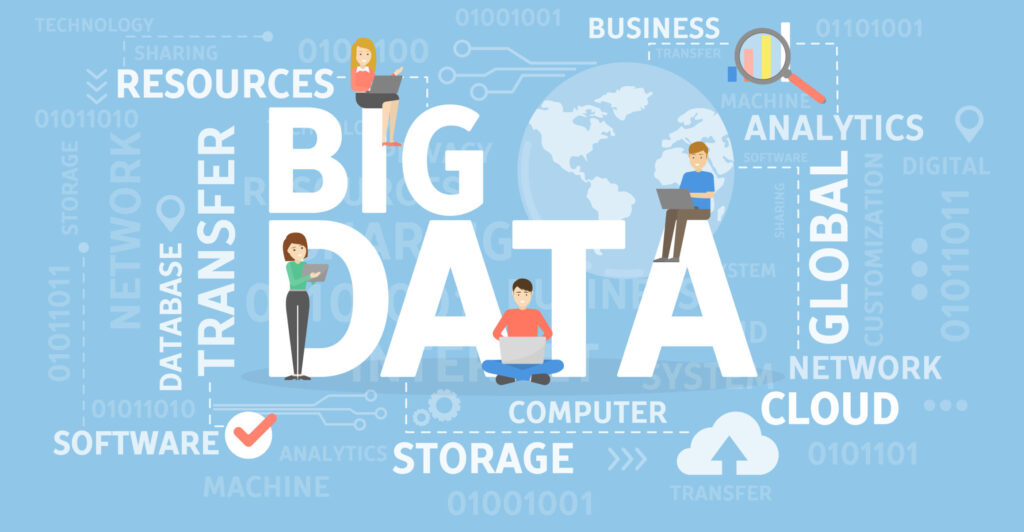
Big data: the buzzword of the digital age. In every industry, from business to government to healthcare to entertainment, its impact is undeniable. This article explores the world of big data, its implications, and how businesses can leverage this colossal force to their advantage.
The Big Data Revolution
The term “big data” refers to the massive volume of structured and unstructured data that inundates organizations on a daily basis. This data encompasses everything from customer transactions and social media interactions to sensor data and more. The key characteristics of big data are commonly summarized as the “3 Vs”: Volume, Velocity, and Variety.
- Volume: Big data is, unsurprisingly, enormous in size. It’s beyond what traditional database systems can handle. In fact, the volume of data generated is so massive that it’s often measured in terabytes, petabytes, or even exabytes.
- Velocity: Data is generated at an unprecedented speed. Social media posts, online transactions, and sensor data are produced in real-time, requiring quick analysis and decision-making.
- Variety: Big data isn’t limited to structured data like databases. It includes unstructured data like text, images, and videos. The variety of data formats makes it more challenging to manage and analyze.
The Implications of Big Data
The implications of big data are vast and multifaceted. Understanding its impact is crucial for businesses and organizations in today’s data-driven landscape:
- Better Decision-Making: Big data analytics empower organizations to make data-driven decisions. By analyzing customer data, market trends, and other relevant information, businesses can identify opportunities and challenges, leading to more informed decision-making.
- Improved Customer Insights: Big data allows businesses to gain a deeper understanding of their customers. By analyzing customer behavior, preferences, and feedback, companies can tailor products and services to meet customer needs effectively.
- Enhanced Operational Efficiency: Big data can optimize operations by identifying inefficiencies and areas for improvement. For example, supply chain management can benefit from real-time data analysis to reduce costs and enhance productivity.
- Personalized Marketing: The ability to collect and analyze vast amounts of data enables businesses to create highly personalized marketing campaigns. This personalization can lead to higher conversion rates and customer engagement.
- Predictive Analytics: Big data can be used to predict future trends, market shifts, and even potential equipment failures. This foresight is invaluable for risk management and strategic planning.
- Scientific and Medical Advances: Big data plays a significant role in scientific research, genomics, and healthcare. It helps in analyzing large datasets and finding correlations that were previously impossible to discover.
- Cybersecurity: The vast amount of data generated can be harnessed for cybersecurity, helping organizations detect and prevent cyber threats in real-time.
Harnessing Big Data for Business Success
To harness the power of big data effectively, businesses need a well-defined strategy:
- Data Collection: Businesses must identify the type of data they need and invest in the tools and technologies required to collect it. Data can come from various sources, including customer interactions, IoT devices, and social media.
- Data Storage and Management: It’s essential to have a robust data storage and management system in place. Cloud computing, data warehouses, and distributed databases are all options to consider.
- Data Analysis: Businesses need the right analytical tools and algorithms to derive valuable insights from the data. Machine learning and artificial intelligence can play a significant role in data analysis.
- Data Privacy and Security: With great data comes great responsibility. Safeguarding customer data and complying with data protection regulations are paramount.
- Data-Driven Culture: Foster a data-driven culture within the organization. Ensure that employees are trained to interpret and utilize data effectively.
- Continuous Improvement: Big data analytics is an ongoing process. Regularly review and refine your strategy based on the insights gained and changing business needs.
In conclusion, big data is more than just a buzzword; it’s a transformative force that has forever altered the business landscape. Its implications are far-reaching, from better decision-making to scientific breakthroughs. By understanding the world of big data and implementing a well-thought-out strategy, businesses can harness its power to thrive in today’s data-centric world. The key is to embrace big data, adapt to its challenges, and use it as a catalyst for innovation and growth.
